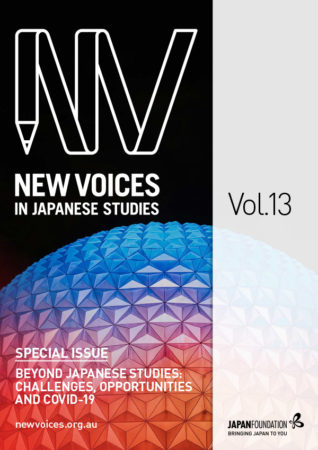By Keiji Shono
Director
The Japan Foundation, Sydney
Welcome to Volume 13 of New Voices in Japanese Studies, the journal’s first-ever special issue. I am delighted by the calibre and timeliness of the work contained in this volume, which illustrates how the lens of Japanese Studies can help us to view and understand some of the pressing challenges and changes faced by global society in our present moment.
The Volume 13 special issue comes on the back of an online symposium held earlier this year, co-presented by The Japan Foundation, Sydney and the University of New England. The symposium was titled ”Beyond Japanese Studies: Challenges, Opportunities and COVID-19″, and was designed to provide a forum for early career Japan scholars in Australia, New Zealand and the broader Asia-Pacific region to consider ways of extending the reach and relevance of their research. The symposium attracted a level of interest beyond expectation: 28 abstract submissions, 16 presenters (more than originally planned), 180 registrants and a distinguished keynote speaker—sociologist and migration scholar Professor Gracia Liu-Farrer of Waseda University. As these numbers demonstrate, the project resonated with many in the Japanese studies community for the way it sought to address emerging needs.
Since its inception, New Voices in Japanese Studies has been dedicated to providing a platform for outstanding research by emerging scholars with ties to Australia and New Zealand. In another first for the journal, this volume extends that remit to include authors from the broader Asia-Pacific region. The combined locations and backgrounds of the authors in this volume, together with the subject matter they take up, represents a vast regional network which encompasses Australia, Brunei, Cambodia, Guam, India, Japan, Laos, the Philippines, Singapore, USA and Vietnam. In this way, not only does the volume discuss the transnational relevance of Japanese studies today, it also enacts it.
This special issue and the symposium it stems from were both produced under the shadow of COVID-19. Nevertheless, the contributors and editors alike have weathered the challenges of the pandemic era to produce a piece of work that will stand as an important record of the Japanese studies landscape at this time, as viewed by early career scholars. I would like to thank the article contributors, firstly for their participation in the ”Beyond Japanese Studies” symposium, and secondly for continuing that momentum with their article submissions and following through to publication. I would equally like to thank the blind reviewers who gave so generously of their time and expertise to help bring out the best in these authors and their work. I also extend my thanks to the review authors, who call attention to significant new texts in the field of Japanese studies and highlight their value for others.
Finally, I would like to thank the production team for this volume. This year’s guest editor post was unprecedented in scope, incorporating both the symposium and this volume within a lean timeframe. My deepest thanks go to Volume 13 Guest Editor Dr Gwyn McClelland for his enthusiasm and sustained commitment to this complex extended project. I also acknowledge the hard work and commitment of the New Voices in Japanese Studies Series Editor, Elicia O’Reilly, who departs the journal with the publication of this volume, as well as the indispensable efforts of web and layout designer Kevin Vo.
I trust that this volume will serve its intended purpose of highlighting the broad contemporary relevance of Japanese scholarship in our local region.
September, 2021

